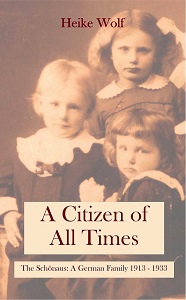The Schönaus are a German family from the educated middle class who, at the beginning of the story, in 1913, lead a comfortable and peaceful life in Leipzig. The three children Charlotte, Dorothea and Heinrich – all named after characters from Goethe’s works – are raised in a humanistic spirit with high moral values. Life seems stable and the future is promising. But the turbulent 20th century soon descends upon the Schönaus. The first volume accompanies the family through World War I and the shattering of their familiar world. During the turbulent years of the Weimar Republic, in a politically unstable time, the three Schönau children take their first steps into adult life. While Charlotte’s sister Dorchen enjoys the liberal cultural life in Berlin, her brother Heinrich is drawn to the wrong circles. Charlotte herself experiences the versatility of being a university student and suffers the first painful loss of her life.
Buy the book:
Author Bio:
Heike Wolf studied to be a lawyer, but she has been fascinated by books and writing ever since she can remember. She started to write fiction as soon as she knew how to write at all (the quality of her works has improved by then). The passion for history came a few years later and so the ground was set for writing historical fiction after she had first focused on non-fiction books for expats to Germany (“Coming to and Living in Germany”, “Cross-cultural musings about Germany”).
Her family history extends across many countries, and she has also lived in various countries herself, so it’s not surprising that her family history and the countries she loves play a role in many of her books. Her two books about the German family Schönau were in large parts inspired by her great-aunt’s life. As Heike Wolf, who grew up with an English mother and a German father, also does literary translations, she translated the first Schönau book into English and is currently working on the translation of the second.
Her novels are characterized by careful research and the skilful interweaving of the historical background with the lives of her characters ¬– “people live history”.
